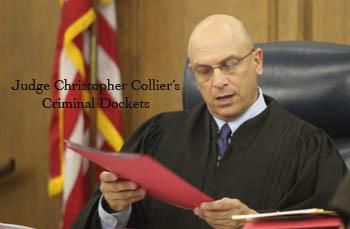Beyond The Gavel: Exploring The Diverse Roles Of Judges Named Collier And Porter
In the vast and intricate tapestry of the American legal system, the names of judges resonate with authority, responsibility, and a profound commitment to justice. While the phrase "Judge Collier Mr Porter" might suggest a singular narrative or a specific interaction, a deeper dive into judicial records reveals a fascinating landscape of individuals bearing these surnames, each contributing uniquely to the fabric of law across various jurisdictions. This article aims to shed light on the diverse roles, significant contributions, and the geographical spread of judges named Collier and Porter, illustrating the multifaceted nature of their service to the public.
The judiciary is not a monolithic entity; it is a complex network of courts operating at federal, state, and local levels, each with its own specific jurisdiction and procedural nuances. From district courts handling everyday disputes to appellate courts reviewing legal decisions, and supreme courts setting precedents, judges are the bedrock upon which the rule of law stands. Our exploration of "Judge Collier" and "Judge Porter" will traverse these different levels, highlighting their individual impacts.
The Many Faces of "Judge Collier"
The name Collier appears in judicial contexts spanning different eras and legal specializations, showcasing the breadth of judicial involvement.
Judge Rabeea Sultan Collier: A Modern Jurist in Texas
One prominent contemporary figure is Judge Rabeea Sultan Collier, a native Houstonian who currently serves as the Presiding Judge of the 113th District Court. Her career exemplifies dedication and expertise in civil law. First elected in 2018 and successfully re-elected in 2022, Judge Collier holds the distinction of being double Board Certified in Civil Appellate Law and Civil Trial Law by the Texas Board of Legal Specialization. Her role in the 113th District Court is crucial for resolving civil disputes, ensuring fair trials, and upholding legal standards within her jurisdiction.
Historical Insights: Judge Collier's Landmark Rulings
Delving into history, we encounter another Judge Collier whose rulings left a significant mark. This historical figure, in a case involving a "Gray v." party, ruled on a matter of profound historical importance: the wrongful taking or detention of a slave was deemed a conversion. Furthermore, this Judge Collier decreed that if the slave was lost while being detained illegally, the party responsible, Crocheron, was liable for the full value. This ruling, while from a bygone era, highlights the profound impact judges have had on societal norms and legal interpretations throughout history, addressing complex issues of property and human rights as understood at the time.
Procedural Nuances: Judge Collier's Courtroom Policies
Beyond specific rulings, judges also shape the practicalities of courtroom proceedings. One Judge Collier is noted for a particular procedural policy: while permitting more than one attorney to handle a trial for a party, the judge stipulates that only one attorney for a party may conduct examination and raise objections during the testimony of any witness. Such rules are vital for maintaining order, efficiency, and fairness in the courtroom, ensuring that trials proceed smoothly while still allowing parties adequate representation.
The Judicial Impact of "Judge Porter"
Similarly, the name Porter is associated with several distinguished judicial figures, each serving in different capacities and making unique contributions to the legal system.
William B. Porter: A Recent Magistrate Appointment
A recent and notable appointment is that of William B. Porter. On November 21, 2023, the Court entered an order appointing William B. Porter as a Magistrate Judge of the United States District Court for the Eastern District of Virginia in the Alexandria division. Magistrate judges play a critical role in the federal judiciary, handling a wide range of duties including preliminary proceedings in criminal cases, civil trials with consent of the parties, and various pre-trial matters. This appointment underscores the ongoing evolution of the federal bench and the continuous intake of new legal talent.
Chief Judge J. Frank Porter: Presiding Over Milestones
Another significant figure is Chief Judge J. Frank Porter. Chief judges often carry additional administrative responsibilities, overseeing the operations of their respective courts while also maintaining a judicial caseload. Chief Judge J. Frank Porter is noted for presiding over significant ceremonies, such as the investiture of Judge Redd, which included remarks from individuals close to Judge Redd, including her sister Gena Newman and longtime friend Beth Schell. Such events are important traditions in the legal community, marking transitions and celebrating judicial service.
Lisa S. Porter: Expertise and Scheduling
The legal field also recognizes Judge Lisa S. Porter, whose professional background, legal expertise, and career highlights can be explored on platforms like Trellis.Law. These platforms provide valuable insights into a judge's history, analytics, and recent case histories, offering transparency and information to legal professionals and the public alike. While a detailed biography for Judge Lisa Porter might not be readily available in all public domains, information regarding her scheduling procedures is often provided, indicating her active role in managing court dockets and facilitating legal proceedings.
Judicial Circuits and County Courts: Where Judges Serve
The judges mentioned, whether Collier or Porter, operate within specific geographical and jurisdictional frameworks. Understanding these structures helps to contextualize their roles and the broader legal landscape.
The 20th Judicial Circuit: A Hub for Justice in Florida
The 20th Judicial Circuit in Florida is a prime example of a multi-county judicial district. It encompasses Charlotte, Collier, Glades, Hendry, and Lee Counties. Collier County itself is served by both a circuit court and a county court, handling different types of cases. The judges within this circuit are integral to providing justice to the people of these counties. For instance, in 1999, then-Chief Judge William L. Blackwell established the first Adult Drug Court in the 20th Judicial Circuit, a pioneering initiative right there in Collier County, demonstrating the circuit's commitment to innovative approaches to justice. More recently, the investiture of Collier County Judge Chris Brown, sworn in by Chief Judge-Elect Frank, was a significant event attended by many family, friends, and colleagues, highlighting the close-knit legal community within this circuit.
For those seeking information on judges operating within this circuit, resources are available. You can view all the judges that operate within the 20th judicial circuit and go to their webpage for specific information provided by the Judge. Additionally, platforms like Trellis.Law offer a comprehensive collection of judges serving in Collier County through their Collier County Judge Directory, providing access to detailed profiles, analytics, and recent case histories.
Kansas State Courts: Resolving Disputes
Beyond Florida, other states like Kansas also illustrate the structure of state court systems. Kansas state courts—including district courts, the Court of Appeals, and the Supreme Court—provide the people of Kansas a venue to resolve disputes through a legal process. District courts, such as the Pratt County District Court located at 300 S Ninnescah St, Pratt, KS 67124, serve as the primary trial courts, handling a wide array of civil and criminal cases. Information on these courts, including reviews, ratings, hours, phone numbers, and directions, is often publicly accessible, along with details about jury duty, the District and County Clerk of Court, and other Pratt County info. While no specific Judge Collier or Porter was explicitly listed in the provided Kansas judicial data, the structure highlights the broad reach of the American judicial system.
The Kansas judiciary also includes Chief Judges like William R. Mott in Sumner County, District Court Judges such as Francis Meisenheimer in Kingman County and Gaten T. Wood in Sumner County, and District Magistrate Judges like Candace, showcasing the various levels of judicial roles within a state system.
Conclusion
The journey through the judicial landscape, focusing on individuals named Collier and Porter, reveals a rich tapestry of legal service. From historical rulings that shaped societal understanding to contemporary appointments and the intricate procedural rules that govern courtrooms, judges bearing these surnames have made, and continue to make, profound contributions. Whether it's Judge Rabeea Sultan Collier's modern leadership in Houston, the historical impact of a Judge Collier's ruling on property rights, the recent federal appointment of Magistrate Judge William B. Porter, or the administrative leadership of Chief Judge J. Frank Porter, each individual plays a vital role in upholding the rule of law.
Furthermore, understanding the context of judicial circuits like Florida's 20th Judicial Circuit or the comprehensive court system in Kansas helps appreciate the decentralized yet interconnected nature of justice delivery. These judges, along with countless others, are the guardians of legal processes, ensuring that disputes are resolved fairly and that justice is accessible to all. The availability of resources like judge directories and court webpages further empowers the public to engage with and understand the judicial system, fostering transparency and accountability in the pursuit of justice.

Judge Collier - Realtor - Coldwell Banker Bullard | LinkedIn

Gov. DeSantis names Devin Collier to Circuit Judgeship - Larry Basford

Judge Christopher Collier's Criminal Docket, July 6 | News